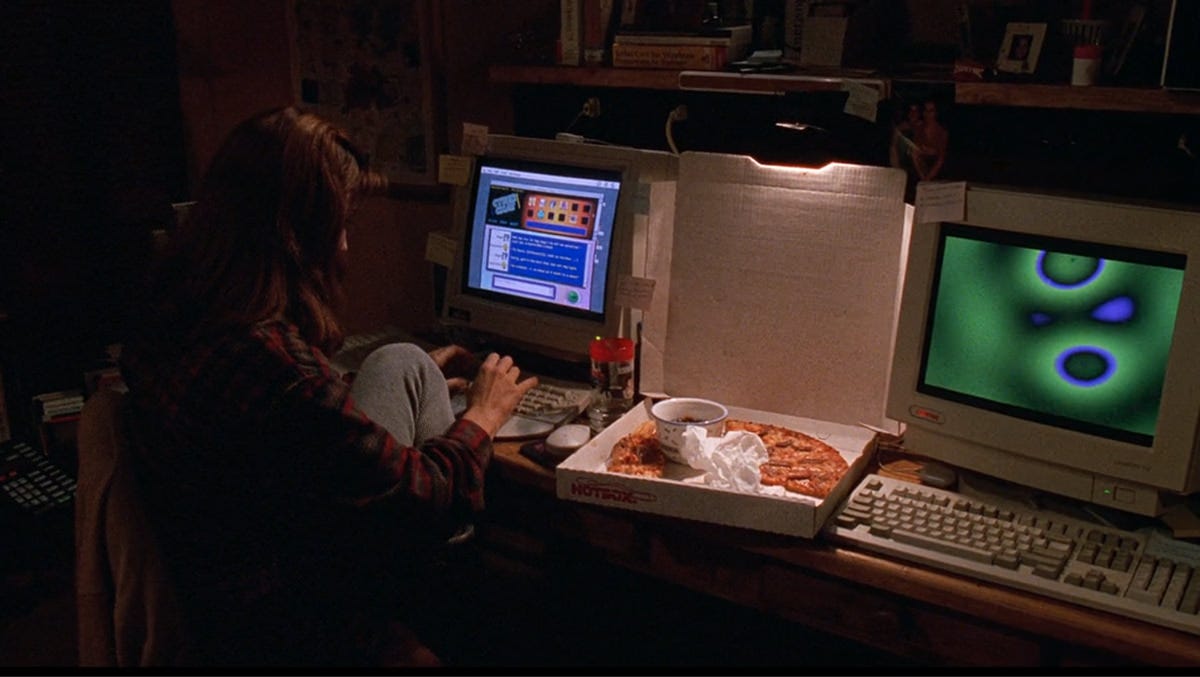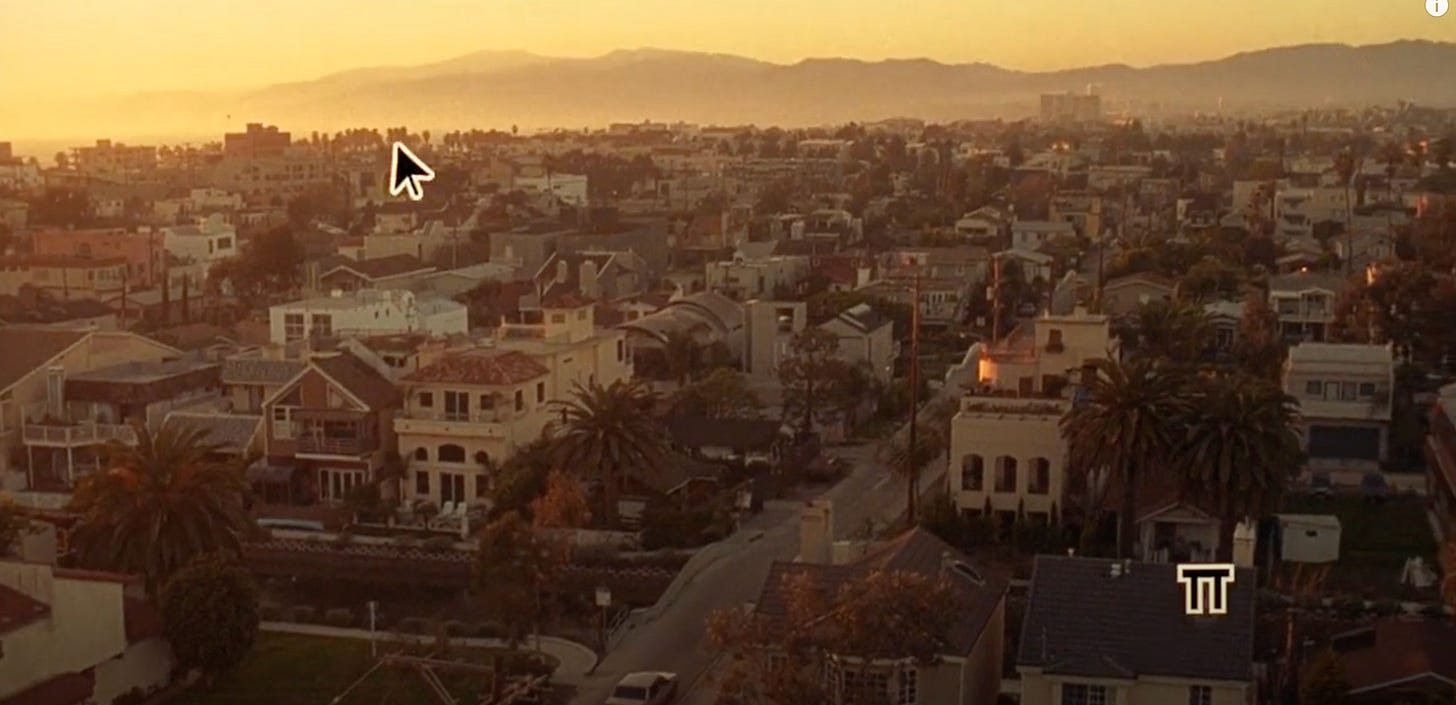Re-logging the Self
The Net (1995) as Early Cinematic Philosophy of Life Online
When Irwin Winkler’s The Net opened in the summer of 1995, the World Wide Web was still an awkward buzzword. Only 1 % of the planet was online, and “surfing” meant dial-up tones and Netscape’s meteor icon spinning across a beige screen. Yet this modest techno-thriller already intuited a problem that would define the next three decades: not simply that our data could be stolen, but that our very selves might evaporate once we began living through machines. Re-watching the film today is like unearthing a prophetic artifact of cinematic philosophy. It stages a thought-experiment every bit as pointed as a classroom trolley problem: what happens to personal identity when technological mediation becomes the dominant form of human relationship?
Identity-theft or identity-loss?
The plot everyone remembers is textbook nineties paranoia. Angela Bennett (Sandra Bullock), a brilliant but solitary systems analyst, accidentally uncovers a backdoor called “Gatekeeper” that allows a shadowy cabal—the Praetorians—to rewrite any database in the world. They erase Angela’s records, swap her for an (invented) felon named Ruth Marx, and embark on a killing spree by keystroke. On the surface, then, The Net is a cautionary tale about credit cards, Social Security numbers, and the fragility of digital documents. Bennett herself voices the standard reading after her arrest:
“Our whole world is sitting there on a computer… like this little electronic shadow on each and every one of us just begging for somebody to screw with. They’ve done it to me and they’re going to do it to you.”
But the script’s more unsettling insight lies beneath the headline. Identity theft succeeds not merely because data can be altered, but because Angela’s human relationships are so thin that no one can vouch for her existence. She telecommutes; she orders pizza through “Pizza.net”; her closest companions are disembodied handles—“Iceman,” “CyberBob”—in a chat window that flickers beside a looped video fireplace. When a neighbour is asked whether she knows the woman who has lived across the street for four years, she shrugs. Even Angela’s frail mother, suffering from Alzheimer’s, cannot recognise her. The Net quietly suggests that the truly terrifying vulnerability is social, not technological: a self shorn of reciprocal recognition is always one database query away from dissolution.
The wired hermit as philosophical type
Seen through this lens, Angela is less a classical Hollywood protagonist than an early avatar of what Sherry Turkle would later call “the tethered self.” Her modus vivendi is to remain unseen, audible only as a compressed voice or a glowing cursor. When a client invites her to dinner, she begs off, opting instead for cyberspace chatter about Captain America and Albert Schweitzer. Bullock’s charisma masks what the script plays absolutely straight: Angela is pathologically lonely. She has had “two significant relationships” in her adult life, one with a former therapist she visited because, in her own uncertain words, “I thought I was lonely” .
The film repeatedly literalizes this isolation. On a Mexican beach holiday—her first offline adventure—Angela and the suave Jack Devlin admit that even paradise cannot compete with the itch to “hook up my modem.” Devlin weaponizes her digital footprint to seduce her, demonstrating that intimate knowledge no longer requires intimacy, only surveillance. The Net thus anticipates the insight of contemporary media theorists: connectivity is not the same as connection, and the efficiency of data exchange can corrode the slower labour of building mutual trust.
Memory, machines, and the Alzheimer’s allegory
A running visual motif juxtaposes computer memory with human forgetfulness. Angela’s Alzheimer’s-stricken mother hammers clumsy chords on a piano, oblivious to the daughter sitting beside her. Later, hospital staff refuse to accept that Angela’s friend Alan is not diabetic because the computer insists he is. It is no accident that the Praetorians’ symbol is π, the infinite decimal of calculation without meaning. Like Alzheimer’s plaques, their code eats away at the connective tissue of personal narrative.
Here the film brushes against philosophical anthropology. If, as Charles Taylor argues, humans are self-interpreting animals, then dependable memory—held in community, ritual, or dialogue—is essential to continuing personhood. By outsourcing remembrance to databases, we risk what Angela’s mother embodies biologically: a hollowing-out of the first-person perspective. The horror is not merely losing data but losing witnesses who can say, “Yes, I know who you are.”
An ambivalent techno-escape
In the third act Angela fights back with the hacker’s equivalent of soap and water: she uploads a virus that erases Gatekeeper, then smashes a hospital monitor in frustration. These gestures hint at technological iconoclasm—literally breaking the screen that mediates her reality. Yet the film cannot imagine a world free of computers. The closing tableau shows Angela back at her keyboard while her mother plants flowers outside. Domesticity is restored, technology domesticated, but the modem still hums. The Net wants us to log off, touch grass, and call our mothers, yet it also normalises the inevitability of the network. Its solution is reformist—better “cyber hygiene,” more secure backdoors—rather than revolutionary.
Critics might accuse Winkler of retreating into a 1950s fantasy of suburban wholeness. Can the “wired hermit” simply boot up a healthy social life after a single heroic exploit? Probably not. Still, the tension highlights a genuine philosophical dilemma: how do we balance the relational goods of embodiment with the undeniable affordances of digital life? The ending’s single most unsettling shot—a mouse-cursor clicking the Praetorians’ π logo before the screen blinks to black—reminds us that we, the viewers, are also trapped in a mediated apparatus. The cinema screen, like the monitor, frames and edits our field of vision. There is no outside, only competing layers of mediation.
Lessons for the age of biometric log-ins and deepfakes
Three decades on, The Net looks quaint—Gatekeeper hacks Flashing Blue Screen of Death; Angela copies files onto a 3.5-inch floppy—but its philosophical hunches have only grown sharper.
Data theft is secondary to relational erosion.
Credit monitoring services did not solve the loneliness epidemic or the crisis of civic trust. Bullock’s nightmare comes true in a culture where many friendships are algorithmically “suggested” and ghosted overnight.Digital doubles threaten narrative coherence.
Today’s generative AI can fabricate voice prints, swap faces, and overwrite public memory in seconds. The film’s forged mugshot now feels almost charmingly analog.Memory kept for us is memory taken from us.
Cloud back-ups relieve us of remembering phone numbers, directions, birthdays—and perhaps eventually values, skills, even moral discernment. The Alzheimer’s allegory was prescient.Technological critique tends to stop at technical fixes.
The Net offers a stronger firewall; Silicon Valley sells privacy-as-a-service; governments legislate “right to be forgotten.” All worthy, none sufficient. The deeper work is relational and ethical.
Re-centering the embodied, social self
If The Net functions as early cinematic philosophy, its core claim aligns with thinkers from Hannah Arendt to Mary Midgley: personhood is not an internal essence but an activity—narrated, recognised, and sustained in community. In 2025 the remedy is therefore not nostalgia for pre-digital purity, nor blind optimism about transhuman upgrades, but what feminist technoscience calls “socio-technical imagination.” We can design, legislate, and inhabit technologies that foreground reciprocity rather than replace it.
Imagine a social platform that defaults to small, persistent groups instead of frictionless virality. Envision authentication protocols that require human witnesses alongside biometrics. Consider algorithmic feeds that privilege local, overlapping ties over parasocial followership. These may sound utopian, yet they speak to the film’s buried insight: the self flourishes when embedded in a web of accountable others, not when reduced to a string of credentials.
Conclusion: logging out or logging better?
The Net never quite decides whether technology is a tool to be tamed or a trap to be escaped. That ambiguity is precisely why it rewards philosophical viewing. It dramatizes what Hubert Dreyfus would soon call the “disembodied telepresence” threatening modern agency, while gesturing, however timidly, toward restoration through touch, earth, and face-to-face conversation.
For those of us writing and reading Substack essays—another paradoxical exercise in mediated intimacy—the film poses a final question. When you close this tab, who knows you well enough to counter a deepfake, to call you by name when the databases glitch? If the answer feels shaky, perhaps Bullock’s modest act of stepping away from the keyboard to plant something living isn’t a Hollywood cliché after all. Perhaps it is the oldest philosophical prescription on record: to know thyself, seek the company of others—and keep the machine at arm’s length.








